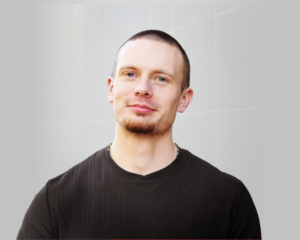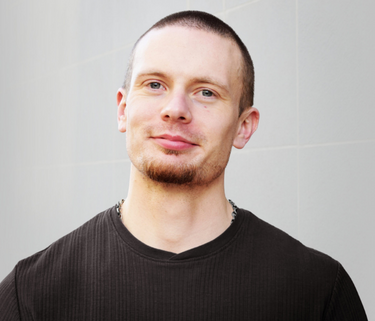I Turn My Suffering Into Art To Tell Others How Far I’ve Come, so They Know They Can Do It Too
By Poet and Speaker Russell Lehmann
 I grew up in the Seattle area. I wasn’t diagnosed [with autism] until I was 12, even though I struggled from the day I came out of my mother’s womb because we couldn’t find a competent doctor. I was struggling with severe OCD and panic attacks that consumed my life. I was that “weird” kid in the corner of the classroom with his hood on, not making any eye contact, or even speaking. I was completely closed off, a prisoner inside my own body. When I finally got my diagnosis, suddenly I wasn’t just that weird kid anymore, I was the weird autistic kid. A word that, back in 2003, was very misunderstood and oftentimes resulted in either pity or unconscious spite, for my behavior, on face value, made it seem like I was lazy and disinterested in life. If only they could hear my heart’s silent cries for help.
I grew up in the Seattle area. I wasn’t diagnosed [with autism] until I was 12, even though I struggled from the day I came out of my mother’s womb because we couldn’t find a competent doctor. I was struggling with severe OCD and panic attacks that consumed my life. I was that “weird” kid in the corner of the classroom with his hood on, not making any eye contact, or even speaking. I was completely closed off, a prisoner inside my own body. When I finally got my diagnosis, suddenly I wasn’t just that weird kid anymore, I was the weird autistic kid. A word that, back in 2003, was very misunderstood and oftentimes resulted in either pity or unconscious spite, for my behavior, on face value, made it seem like I was lazy and disinterested in life. If only they could hear my heart’s silent cries for help.
Suffice to say, this diagnosis, although welcomed, made me even more of an outcast when it came to my interactions, and lack thereof, with society—there’s a lot of stigma. I eventually had to drop out of public school due to my struggles which quite rapidly dissolved all bridges to the outside world, and from 12 to 27 I was completely isolated—my mom would bring home my work and take it back to school for me throughout middle school and in high school, I stayed home and took online classes to receive my GED. I missed out on the entirety of my adolescence, teenage years, and transition into an adult. I didn’t know what it was like to have friends or to even be around others outside of my immediate family. Isolation can do strange things to the mind, the repercussions of which I still deal with to this day.
In my early 20s, I began dabbling in poetry, and this art soon became the friend and companion I had always yearned for. To be able to express my pain, frustrations, dread, sadness, and ongoing struggles was extremely liberating, and to create a piece of art, a poem, out of my suffering, well…there’s not much that was, and is, more cathartic and healing.
In my mid-20s, I self-published a book of poetry that was met with much appreciation for the rawness and transparency it portrayed into my lived experience. The book was featured in the LA Times, earned an Honorable Mention at the 2012 NY Book Festival, and won the award for Literary Excellency at the 2013 International Autistic People’s Awards in Vancouver, Canada.
A few years later, I decided to try and take my advocacy efforts to the next level. I was 25, on disability benefits with no job, living with my parents, and hadn’t had friends in almost 14 years. I knew I had a lot to give and not much to lose, so I set my sights on becoming a public speaker to speak up for those who are pushed to the margins of society like me.
Things took off quite rapidly, as I had a natural talent for connecting with others through topics of vulnerability, a positive by-product of spending half my life alone and looking inward into my painful emotions. Some call me a self-advocate, but I’m not doing this for me. I am doing this so that others have it a bit easier. I shed hindsight and insight to generate foresight for others and perform spoken word poetry in my presentations to offer a more dynamic look into the world of autism, mental health, and the suffering of existence, for it is my belief that art would cease to exist it if wasn’t for the universal commonality of human suffering.
I’ve come so far in life that I feel as if I have lived multiple lives. I had so many dreams growing up, but my struggles got in the way and squashed them, along with an insincere societal environment that put the final nail in the coffin of what I had hoped for my future.
In July of 2021, I decided to take a huge risk and move to Los Angeles by myself to start a new chapter of personal and professional growth, without knowing anyone. If there is one thing my seclusion has always brought me, it was time alone with my heart; time I did not, and still do not, take for granted, for the heart knows the way, and I always listen to mine.
I had been speaking full-time for about three years, but I conflated this professional success with having a personal life, and when travels ceased during COVID I realized that while I may have been traveling quite frequently, I was still very much in a bubble, for my only socialization in my personal life was with my mom, the one human who had been by my side since day one. The decision to move to LA by myself and leave my mom’s side, the sole source of safety and support I had ever known, was brutally painful, to say the least. However, discomfort is the impetus behind growth of any kind, and now, for the first time in my entire life of 31 years, I am fully independent, and for the first time in 20 years, I can finally say three words I had always dreamed of saying: “I have friends”. It’s excruciatingly overwhelming at times and emotionally exhausting, but I know I have to encounter the immense growing pains in order to make up for my lack of social experience.
I have an incredible career, but the friction I encounter with society on a daily basis is a lot to cope with. My job requires a lot of travel, and I’ve had numerous meltdowns (mental and emotional breakdowns due to system overload stemming from external stimuli and exacerbated symptoms of OCD and anxiety, all in the midst of an extremely overwhelming scenario) at airports where passersby see a grown man curled into a ball, sobbing, rocking back and forth, and biting his nails. If I looked more disabled, maybe people would be more understanding, but no one would know or think I have autism when I’m walking down the street—so if they see me having a meltdown, they don’t recognize that as autism, and either look upon me as if I am crazy, or don’t look at all and pretend I’m invisible. I am not sure which response is more soul-crushing.
It’s a rough world out there, for during my moments of crisis, where all I need is some simple reassurance and compassion, I have had cops called on me. When I have meltdowns in public, I just look like a scary big grown man, and no one wants to come close to me. I receive no help—and I know a lot of people go through these situations too. Once I was in Dallas on a layover, and I missed my connection. I had a meltdown and was crying. Ten desk agents were right in front of me and not one even looked at me. I even said, “I have a disability, can someone please help me? ” They just continued to ignore me. The trauma that occurs in situations like this deepens a lifelong wound of being cast aside by society.
In situations like that, I need simple human connection. People need more training on emotional awareness—look into my eyes and see that I’m struggling. I know it’s not intentional, it’s from a lack of awareness. I don’t need you to fix anything, I just want support. Just sit next to me and ask if there’s anything you can do. I will most likely say that just asking that question helps.
We run from things we don’t understand because they scare us, for we as humans fear the unknown. Yet, if we can stop and stare back at our fears, instead of turning our back on them, we begin to see that which scares us dissipate like morning fog, revealing behind it a beautiful sunrise.
Travel is picking back up again for my speaking engagements now, and so I embrace the suffering. My experiences with a lack of understanding are frustrating, but I continue to do it because I have a passion inside of me to tell others how far I’ve come, and I want others to know they can do it too.
I gave a TED Talk at UCLA a few months ago, and recently did my first open mic performance. My journey has always been arduous, but now I can say that it has become beautifully arduous, for so many great things are happening for me now. My potential is sky high, and I have had more personal and professional success just one year into being fully independent than I had in my prior 30 years combined. Who knows what I’ll do or where I will go, but I have full faith that this journey will only continue to become more fulfilling. I followed my passion and success found me. If it is one thing I don’t want to regret on my deathbed, it would be not following my heart at any given moment– we have to follow our heart, it truly knows the way! You may go on some beautiful detours and scenic routes, but with patience and gratitude, life will unfold before you.
Want to read more stories like this? Visit thearc.org/stories.
Website: www.TheAutisticPoet.com
Instagram: @russl.co
Spoken word poem: “Dear Russell”








